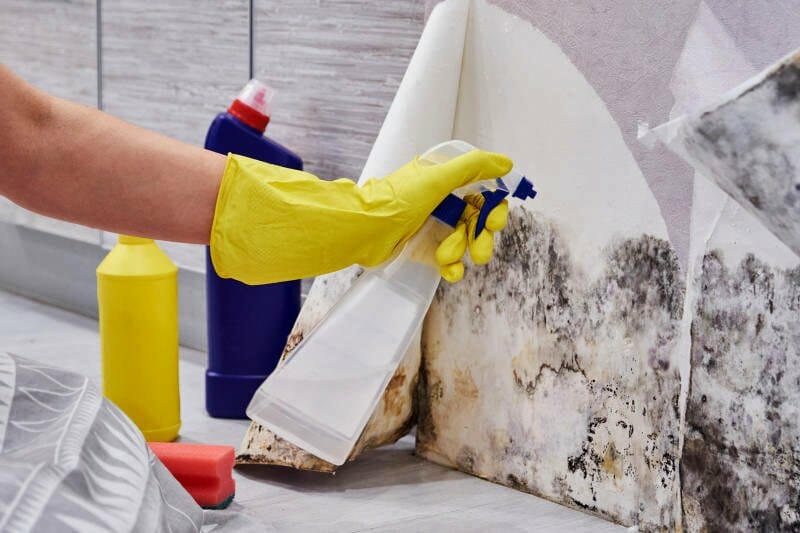Fighting against mold poses a significant challenge for property owners and tenants alike. It’s crucial for landlords to take preventative measures to guarantee the safety of their tenants, while those living in the property seek a clean and secure living environment.
Unfortunately, there are no specific laws in Alaska State that deal specifically with mold in rental units. The terms of the lease contract, the cause of the mold growth, and local codes will determine the rights and responsibilities of tenants and landlords regarding mold.
Although there is no specific written law for mold issues in Alaska, the landlords do have the responsibility to keep a tenant’s home habitable and the tenant should do everything possible not to cause mold.

What we cover
ToggleLandlord-Tenant Laws Regarding Mold
Alaska Landlord & Tenant Act states that landlords must make all repairs and do whatever is necessary to put and keep the premises in a fit and habitable condition.
Responsibilities of the Landlords
Landlords are responsible for making sure the home is livable and there are no water leaks or water damage from previous leaks. Leaking pipes, roofs, and gutters are a significant contributor to mold accumulation in a home.
Responsibilities of the Tenants
Tenants have the responsibility to use the provided ventilation systems in both the kitchen and the backroom to reduce ventilation systems in both the kitchen and the backroom to reduce the condensation from cooking, running the dishwasher, and hot baths and showers.
Who Has To Clean Mold in a Rental in Alaska State?
Even without specific laws governing mold, landlords can be held responsible for mold problems in a rental, and a landlord has the responsibility to provide safe and livable housing.
On the other hand, renters have the responsibility to keep mold under control as the landlord and can be the liable party in a molded case of their neglectful behavior.
If you as a tenant suspect mold, you must give your landlord a chance to fix the problem before you do anything else.

How Does Mold Affect Air Quality?
By producing spores mold affects the air quality by becoming airborne when disturbed. Airborne spores are inhaled into the lungs causing a variety of reactions.
The following symptoms indicate that you have inhaled mold spores:
- Sneezing
- Runny nose
- Irritated eyes
- Skin rash
- Severe asthma attacks
How Long Does the Landlord Have To Fix a Mold Problem in Alaska?
Landlords have a duty to make repairs and maintain their rental properties as soon as possible. They are responsible for maintaining habitable premises and must make repairs within 10 days after they receive the notification from the tenant that something is wrong with the apartment.
If not, then Alaska tenants are empowered to make the repairs themselves and deduct the cost from future rent payments.
Can You Withhold Rent in Alaska Due to Mold?
If you as the tenant can prove that mold is dangerous you can break the lease by vacating early. But it depends on whether or not the landlord can fix the problem or release you from your rental agreement without penalty.
If you have done everything you could, such as using a ventilation system during showers and cooking, you can’t be held responsible for the mold problem in Alaska.
The bottom line is that if the landlord isn’t able to fix the mold problem then he should release you from the rental agreement.
Can You Sue the Landlord in Alaska for Mold Exposure?
Yes, if you can prove that the landlord breached his/her duty to protect your health and violated the rental agreement.
Suing in Alaska related to mold could be successful only if the mold damage and mold exposure were caused by negligence on behalf of the landlord or due to failure to uphold legal responsibilities as set out in the Landlord-Tenant Act.
Since suing for mold in Alaska can be very tough, you must have all of the necessary evidence to support your case. Suing for mold should be a last resort and should only occur if all other avenues have been exhausted.

Disclosure Obligations in Alaska Regarding Mold
If you want to sell a house or rent an apartment in Alaska, you must know that there is a specific law, Alaska Stat. 34.70 et seq., about all disclosure statements that you have to give to the potential buyer.
Disclosure Law for Home Sale
The law I mentioned above broadly covers disclosure requirements for home sellers in Alaska.
Unless the buyer and seller agree to waive this requirement, the seller must deliver a completed written disclosure statement to the potential buyer before even the buyer makes a written offer for the property.
Note: See the full list of states and mold laws here













